Philippa Moore's Blog, page 19
April 18, 2017
unfold your own myth
"...don't be satisfied with stories, how things
have gone with others. Unfold
your own myth, without complicated explanations,
so everyone will understand the passage,
We have opened you.
Start walking towards Shams. Your legs will get heavy
and tired. Then comes a moment
of feeling the wings you've grown,
lifting."
- Rumi (trans. Coleman Barks)
April 17, 2017
it's not just me (or you)
“Usually, writers will do anything to avoid writing. For instance, the previous sentence was written at one o’clock this afternoon. It is now a quarter to four. I have spent the past two hours and forty-five minutes sorting my neckties by width, looking up the word “paisley” in three dictionaries, attempting to find the town of that name on The New York Times Atlas of the World map of Scotland, sorting my reference books by width, trying to get the bookcase to stop wobbling by stuffing a matchbook cover under its corner, dialing the telephone number on the matchbook cover to see if I should take computer courses at night, looking at the computer ads in the newspaper and deciding to buy a computer because writing seems to be so difficult on my old Remington, reading an interesting article on sorghum farming in Uruguay that was in the newspaper next to the computer ads, cutting that and other interesting articles out of the newspaper, sorting—by width—all the interesting articles I’ve cut out of newspapers recently, fastening them neatly together with paper clips and making a very attractive paper clip necklace and bracelet set, which I will present to my girlfriend as soon as she comes home from the three-hour low-impact aerobic workout that I made her go to so I could have some time alone to write.”
— P. J. O’Rourke
April 16, 2017
if you want eternity you must be fearless: my favourite reads of 2016
Let's get something out in the open straight away - 2016 was a sucky old year in many, many respects and I for one was not sorry to see the back of it. This year, 2017, already feels lighter, like the heavy energy of the last twelve months has lifted. That said, there are still a few loose ends to be tied up and one of them was deciding on my favourite reads of the year and sharing them on the old blog, as has become a Phil Tradition.
I thought it would be hard to narrow down, as always, but for a change there was a clear winner....the book I was most excited about in 2016 and most enjoyed reading, in fact I enjoyed it so much I read it twice in two months, was The Museum of Modern Love by Heather Rose (Allen and Unwin, 2016). It hasn't been released in physical form in the UK, so last September when one of my best friends was visiting, she brought me a copy over, mere weeks after release!
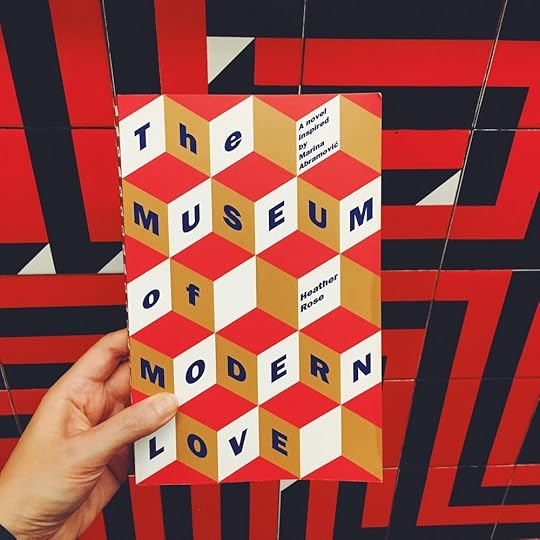
The Museum of Modern Love by Heather Rose
Heather is one of my heroes. She has been publishing wonderful, exquisitely written fiction, for adults and children, for the best part of two decades now. Whenever someone has asked me in the past to name my favourite writers, and I listed Heather among them, nine times out of ten they wouldn't have heard of her. But this novel is getting her some much deserved and long overdue attention in Australian literary circles - in fact, it's been shortlisted for this year's Stella Prize.
"I think art saves people all the time."
The Museum of Modern Love seems like such a simple story on the surface, but Heather Rose is in fact threading together many, multi-layered, complex themes and ideas, highlighting that simplicity is often a guise for the most complicated things, art most of all.
Intertwined with a unique exploration of art - what it is, what it isn't, how do you get it to mean something, how does the public's reaction to it influence its meaning and power - is a story about love, loss, grief, heartbreak, betrayal and, most of all, courage.
The novel takes place against the backdrop of a real life event - the three-month performance of 'The Artist is Present' by Marina Abramovic in New York City in 2010. For those who don't know, the piece involved the artist sitting still for 7 hours a day and inviting members of the public to sit opposite her. There was no interaction in the traditional sense - no touching, no speaking - but artist and audience member sat opposite each other and held eye contact, for however short or long a time as the audience member wanted, or could bear. Many found it a very moving experience and came back again, to sit opposite the artist, and to be seen by her.
"She watched as the final hours of The Artist is Present passed by, sitter after sitter in a gaze with the woman across the table. Jane felt she had witnessed a thing of inexplicable beauty among humans who had been drawn to this art and had found the reflection of a great mystery. What are we? How should we live?"
In The Museum of Modern Love, a fictional tale unravels about several people who find themselves witnessing, or participating, in Abramovic's performance and how it affects their lives. The central character is Arky Levin, a celebrated composer of film scores, who is grieving for his terminally-ill wife who hasn't physically died yet but, out of supposedly wanting to spare him grief, moved herself into a care facility and cut off all contact with him. His 22 year old daughter also seems to want little to do with him. Unsurprisingly, Arky finds inspiration is eluding him. Arky somehow ends up at "The Artist is Present" and, over the course of the next three months, watches the performance unfold and various aspects of his life untangle in response.
I loved the insight into the creative process from perspectives other than writing and acting - the visual arts, architecture, music composition. For a novel, it is a remarkable manual for artists. It even opens with Marina Abramovic's "Seven Steps" (which I now have pinned on the wall above my writing desk).
Therefore, for me, The Museum of Modern Love is almost a manifesto. Heather Rose is asking us, as we read, to think about art and how we connect with it. Connection, after all, as shown through the interweaving stories of all the novel's characters, is what matters, and art is one of the most powerful ways we can connect with each other. But it takes courage to connect, because in reaching out, in asking to be seen, we make ourselves vulnerable. That is art too. Making art is an act of courage. Therefore, live (and create art) with courage. That is the key ingredient.
This is an original, beautiful and utterly compelling novel. I never tire of Heather's writing - to me, her words are like fine wine, only improving with time.
"Art will wake you up. Art will break your heart. There will be glorious days. If you want eternity you must be fearless."
But wait, there's moreThere were so many other books I read in 2016 that I loved, that gave me great comfort, that made me laugh and think, that have been consigned to shelves all within easy reach so I can refer to them again. Here are a few of them!
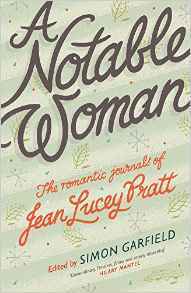
A Notable Woman by Jean Lucey Pratt
I did a lot of research for my current work in progress, which involved reading a lot of war diaries, biographies and history texts about 1940s London. The best of these were A Notable Woman by Jean Lucey Pratt (Canongate, 2015) and Millions Like Us by Virginia Nicholson (Penguin, 2012).
Jean Lucey Pratt was a lifelong diarist who also contributed to the Mass Observation project. Her collected diaries - A Notable Woman - cover nearly her whole life, from her first diary as a child in the 1920s to her old age in the 1980s. She was my age during the second world war and her diaries of course focus on those events but also her daily life and concerns, her dreams, anxieties and longings which for the most part remained unchanged by the war and all its dramas and hardships. She was still a woman who was figuring out who she was and what she wanted, and often pondered about all the what ifs, missed chances and the might-have-beens. It made me realise that the only thing that distinguishes each decade in history is technology - the human heart, with all its wants and needs, remains the same. I enjoyed her later years as much as I did the war years. She was funny, brave and inspiring. This book was a joy to read.
Millions Like Us is also a fascinating read, following the lives of a dozen women of various ages and backgrounds and the changes inn their lives over the course of the second world war.....and, most interestingly for me, what happened once peace came. The seeds of the feminist revolution that came a few decades later were sown, but many were keen for life to resume as it was, which made things very complicated. It was absolutely enthralling to read and an impressive piece of work, I highly recommend it.
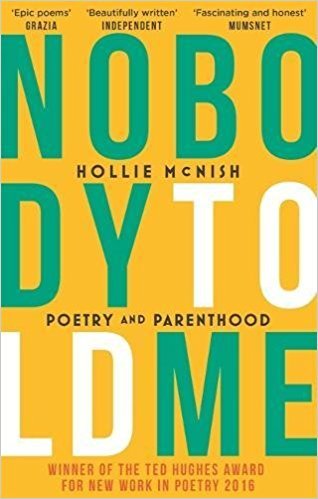
Nobody Told Me by Hollie McNish
Another of my favourite reads of last year was Nobody Told Me (Blackfriars, 2016), a poetry collection by Hollie McNish, which has since won the 2016 Ted Hughes Award. It is a collection of stories, taken from diaries the poet kept during her pregnancy and the early days and years of her daughter's life, of being a young parent in modern Britain. To put it simply - everyone should read Nobody Told Me. Parents, people who want to be parents, and people who don't want to be parents. Those who are and do will feel some solidarity and understanding, those who don't will have their ignorance smashed to smithereens. After reading this book you'll never think 'why would you bring a child on a train at peak hour?' ever again. Hollie's voice is mesmerising, raw, vulnerable, honest, and full of joy. I applaud her and her bravery.
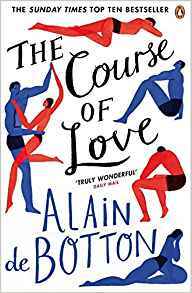
The Course of Love by Alain de Botton
I was also blown away by The Course of Love by Alain de Botton (Simon & Schuster, 2016). Known for his wonderful works of non-fiction, this time de Botton has written a novel that follows the relationship of Rabih and Kirsten over, as the title suggests, the course of their love.
This isn't your typical novel, that's for sure. It reads like a case history in parts, like philosophy in others, and there are other sections where the writing is very lyrical indeed. Whichever genre you think it might fit best, it is a stunning exploration of what it takes to have a successful long term relationship. I think we all know that falling in love is easy. It is the maintaining of that love over the long term, over the course of our lives, that is the real challenge.
Basically, the Romantic notion of love is what sets so many of us up for a fall. Romance is only part of the story. We are ready for marriage, de Botton writes, when we are prepared to love rather than be loved and compatibility, he explains, is an achievement of love - it shouldn't be a precondition.
The exploration of this particular marriage between Rabih and Kirsten covers pretty much everything - disillusionment, loss of desire, adultery, "immature rages, late-night threats of divorce, sullen silences, slammed doors and everyday acts of thoughtlessness and cruelty", as well as the loneliness and fear of being vulnerable that can be felt in long term relationships. Alain de Botton has a voyeur's eye as he zooms in on Rabih and Kirsten, going beyond their physical bodies and into their hearts and minds, where he can see everything and how their past experiences, childhood traumas, their earliest experiences of love and what it meant and how you were supposed to show it, are now playing out in their marriage.
There are many truths in The Course of Love, some of which (having been through a divorce and now having been repartnered for nearly a decade) I knew very intimately. Some of de Botton's observations were so accurate they made me squirm a little. I highlighted a lot of passages on my Kindle version!
Ultimately, I came away from reading this wonderful, wise book feeling reassured and comforted. Human beings are complicated and no relationship is perfect. Love can be quite messy, entailing a lot of compromise, and de Botton's stance is that you can only ever really love and make a success out of a long term relationship if you are prepared to accept that your partner isn't perfect and inevitably they will disappoint you. So much of our disillusionment in life comes from expecting people (not just our lovers, our friends and families too) to be mind readers and meet our needs without our ever having to articulate them, so we need to take a bit more responsibility for ourselves and our own happiness, rather than pour all our hopes into one person. Also, the occasional blips that you might worry about are actually far more common than you think (well, that, or Alain de Botton must have had my house bugged at some point!).
I think this book should be compulsory reading for anyone thinking about getting married. Having got divorced at 26, when I remarried at 29 I think I definitely went into it with my eyes wide open and with realistic expectations - spare yourself what I went through in my first marriage to get to that point, however, and read The Course of Love instead!
I could go on about all the books I read and enjoyed last year - if you want to see them, and what I'm reading on a more regular basis than once a year, I am on Goodreads and you are welcome to add me as a friend!
The best book of 2017 so far? For me, it would have to be Between A Wolf and A Dog by Georgia Blain. I read it in the first few days of January and the poetic and moving experience of reading it I hope bodes well for the rest of my reading year (it has so far).
What was the best book you read in 2016?
April 15, 2017
the painstaking search
‘I don’t wish to inhabit the world under false pretences. I’m relieved to have discovered my identity after being so confused about it for so many years. Why should people be afraid if I confide in them? Yet people will always be afraid and jealous of those who finally establish their identity; it leads them to consider their own, to seclude it, cosset it, for fear it may be borrowed or interfered with, and when they are in the act of protecting it they suffer the shock of realising that their identity is nothing, it is something they dreamed and never knew; and then begins the painstaking search – what shall they choose – beast? another human being? insect? bird?’
~ Janet Frame, Towards Another Summer
April 14, 2017
how to go freelance without losing your mind
I get asked about freelancing all the time so figured this would be a very useful post to do!
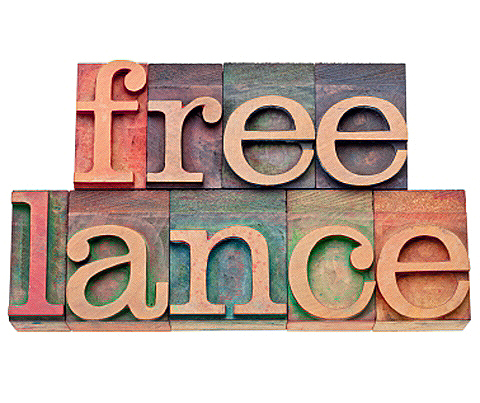
In this day and age, where you can't really open any magazine without seeing a story about someone who's quit their desk job to give their dream a shot, working an office job has almost become unfashionable, a symbol of "selling out".
I really don't agree with that.
I used to, admittedly, as I laboured at my desk jobs in my twenties, dreaming of nothing more than being my own boss, with days to fill as I planned, writing bestselling novels and hard-hitting journalism, even hopping along to a yoga class in my lunch break without needing to be back within the hour, without someone else's agenda to bend to on a constant basis.
But when I started freelancing full time after a well-timed redundancy I learned that, whether it's writing, baking cupcakes or yoga, the minute you start doing it full time, it becomes work. And like any job, it will have its moments of driving you absolutely up the wall.
I don't freelance full time right now - a good opportunity came along for me to go in house, which I've really enjoyed - but I learned a great deal in the two years that I did do it (mostly) full time. In many ways I took it for granted and wish I could do it again but right now I'm really enjoying the benefits and freedom, comparatively speaking, that an in-house position offers too.
I learned so many things as a freelancer, but I think the biggest one was that it's not for the fainthearted. It's really not easy to maintain a consistent level of enthusiasm without the brace of a 9-5 job to keep yourself upright, both financially and in other ways. You need structure and stability to survive the rather grab-bag life of a freelancer and figure out over time the ways that you best keep yourself motivated, sane and forward-thinking.
So here is what worked for me - at least most of the time - and certainly things I wish I had known or figured out sooner. I can't promise that these tips will lead to the pot of gold at the end of the rainbow but I hope they're a good starting point at the very least.
Be discerningI read somewhere (I can't remember where, sorry!) that a freelance gig should be at least two of the following three things:
1. A great opportunity.
2. Financially worth your while.
3. Good exposure.
Ideally it should be all three. But apply this "two out of three" test to any job that comes your way - it really helps, especially in the beginning.
Get a steady and reliable source of income from somewhereLack of regular income is probably the most stressful thing about freelancing. Freaking out about money will not help you produce your best work and it can lead to you making questionable decisions or taking a gig that's not a good fit purely to keep money coming in. Every freelancer I've spoken to has done it so don't feel bad!
The way I solved this problem was getting a part time job, two days a week, and I would really recommend this. It doesn't have to be related to your work, it can just be two shifts a week down at your local Tesco. It just has to be steady and reliable income from somewhere, so you can bank on at least some money coming in each month.
I got a two day a week editing job, covering someone on maternity leave. It was fantastic. I got to go to an office two days a week, I got stimulation and interaction with others, I did work that I was good at (a much needed confidence boost) and I also got to build my skill set.
Get out of the houseStaying at home all day, every day, does start to turn you a bit loopy. If at all possible (if you're a designer or something like that where you need specialist non-portable equipment it might be harder) try to spend at least 50 per cent of your working week outside of your home. Some people invest in a studio space which they share with others. I couldn't afford that so working in a coffee shop or a library (when I couldn't afford coffees) was a god send. Not only did I get a nice walk in to wherever I'd decided would be my office for the day, but I'd interact with other human beings as well - I was getting sick of talking to myself and the plants!
NB: with coffee shops, go early, say between 9am and 11am, and then take a break and come back after lunch when it's less busy. You can't just get one coffee and sit there all day!
This leads on nicely to my next point which is...
Find out what times of day you work best and optimise themThis is your chance to actually work at hours that suit you, that you feel you're at your best at. Most writers I know are early-birds (Andrea Eames, who I interviewed for my podcast, gets up at 5am every day) but I certainly was not. However, I found that if I forced myself to keep usual office hours - ie: be at the desk by 9:00am every day - I usually was very productive. As time went on I found the hours before midday did tend to be the most inspiring for me so I would make sure I got up every morning with my husband, make us coffee while he got ready, go for a quick run or walk once he left for work, and then get down to business by 9:00am each day.
I also recommend deciding on a set time that you work and try to stick to it. It's so easy for freelance work to eat into hours after 8pm and beyond. It can be especially difficult if you're a creative and can't always control when inspiration strikes, but write down your ideas after "office hours" and that way you'll have something to start with when you next clock on. Working all the time not only turns you into a bit of a hermit but it can also be isolating for your partner as well.
Start your own platformOne of the hardest things about freelancing, particularly in the beginning, is being either rejected or ignored much of the time. You start to feel a bit small and useless. The way I combatted this was by starting my own platform to make connections with people I admired rather than being in the cycle of pitching all the time, which really helped boost my confidence. So if you are trying to get a piece published in a magazine or vying to be interviewed for a particular podcast....why not start your own instead? Like anything you'll have to stick with it but it's always worth a try.
Keep fitThis, I found, was crucial. Lisa Jewell goes to the gym every day, Andrea Eames also told me she runs most days....I found getting daily exercise to be a real motivator, as well something to help keep the Freelance Fifteen (or whatever term you want to apply to freelance related weight gain) away! During a period of particuarly low confidence with my work, I trained for three half marathons. Doing that kind of training reminded me of the value of persistence, setting a goal and just bloody well showing up. Keeping your body healthy tends to keep your mind healthy as well. It kept the demons at bay. I recommend it.
Other random lessons about freelancing that I've learned:
Show me the money.This was something I hated doing - chasing people for money or having to ask potential clients whether they were intending to pay me for the work they'd asked me to do. It's so awkward, I know, but you've got to get over it. This is business. This is your business. Don't be flattered they've thought of you and just assume they will pay you. If you skirt around this subject at the beginning of a transaction it will bite you in the arse later on, trust me. Unless it's your mum or a friend to whom you owe a massive favour, do not do ANY work for anyone until you have asked about renumeration. If you get the whole "we don't have the budget to pay you" line, then you make the call as to whether it's worth doing for free (some things are).
Be bold.I know it's uncomfortable, but you have to be able to blow your own trumpet a little bit and, when approaching people, tell them all the cool things you've done and why they should take you on. Self promotion needs to become second nature and, despite your concerns to the contrary, you certainly can do it without being a jerk. Seriously, editors/CEOs/your potential clients are busy people. They need to know very quickly why you are the best person to write that article/be their new intern/design their website. If you don't ask, you won't get and, more to the point, you won't be on anyone's radar - which is crucial to making your freelancing career work.
Do what you say you'll do.If you tell someone you will email them/phone them/be at their office first thing Monday, always follow through. Use every contact you have. And strike while the iron is hot and contact editors/PR people while they will still remember you from that launch/shindig/dark pub.
Motivation is not a dirty word.The buck stops with you so you've got to keep yourself going here. Your partner and your friends can only do so much. Keep yourself accountable. Be disciplined. Change your routine, and often. Surround yourself with inspiration. I often started the day by watching a TED talk or listening to a podcast - anything that would fire me up and get me thinking "yeah, I can do this!"
But tax is.There's no way around this really but to be as organised as possible. If you aren't sure what code you should be on, ring the tax office and ask. Pay your quarterly NI contributions (or whatever the equivalent is in your country) on time. Keep all your receipts. Have a filing system so you know where everything is. And for the love of God, don't wait until the week before the cut-off to file your return! The Guardian has an excellent article about how to manage your finances, particularly tax, as a freelancer.
Obviously I've only really scratched the surface here, but if you want more advice and inspiration, I think one of the best blogs on freelance life, with heaps of practical advice and insights, is Kim Lawler. I love her work.
I think working freelance has so much going for it - flexibility, self-determination, creative control - but I also think having an in-house 9-5 job has many benefits too. Like everything in life, you've got to do what works best for you and never be afraid of making changes if things aren't working out as you hoped. There's more than one road and they all lead to Rome, baby!
I hope you found this useful. If you're a freelancer, what are your tips for staying sane and productive?
April 13, 2017
if you have to be sure
One of my favourite poems, introduced to me by the lovely Marie:
Berryman
by W.S. Merwin
I will tell you what he told me
in the years just after the war
as we then called
the second world war
don't lose your arrogance yet he said
you can do that when you're older
lose it too soon and you may
merely replace it with vanity
just one time he suggested
changing the usual order
of the same words in a line of verse
why point out a thing twice
he suggested I pray to the Muse
get down on my knees and pray
right there in the corner and he
said he meant it literally
it was in the days before the beard
and the drink but he was deep
in tides of his own through which he sailed
chin sideways and head tilted like a tacking sloop
he was far older than the dates allowed for
much older than I was he was in his thirties
he snapped down his nose with an accent
I think he had affected in England
as for publishing he advised me
to paper my wall with rejection slips
his lips and the bones of his long fingers trembled
with the vehemence of his views about poetry
he said the great presence
that permitted everything and transmuted it
in poetry was passion
passion was genius and he praised movement and invention
I had hardly begun to read
I asked how can you ever be sure
that what you write is really
any good at all and he said you can't
you can't you can never be sure
you die without knowing
whether anything you wrote was any good
if you have to be sure don't write
April 11, 2017
stand up and face the east
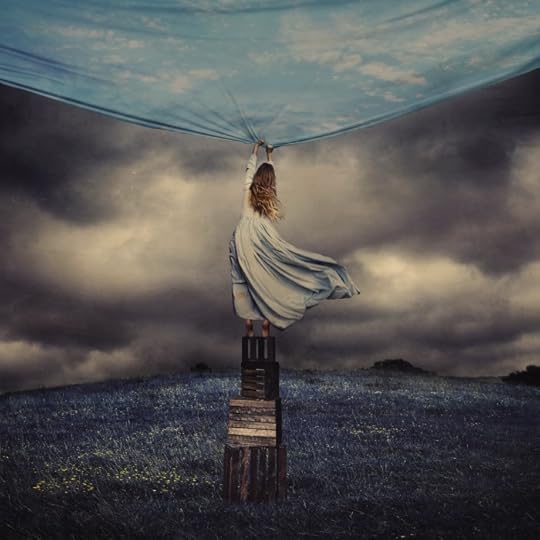
Photo by the incredible Brooke Shaden.
“Do you have doubts about life? Are you unsure if it is really worth the trouble? Look at the sky: that is for you. Look at each person’s face as you pass them on the street: those faces are for you. And the street itself, and the ground under the street, and the ball of fire underneath the ground: all these things are for you. They are as much for you as they are for other people. Remember this when you wake up in the morning and think you have nothing. Stand up and face the east. Now praise the sky and praise the light within each person under the sky. It’s okay to be unsure. But praise, praise, praise.”
– Miranda July
if only you'd remember
"If only you'd remember before ever you sit down to write that you've been a reader long before you were ever a writer. You simply fix that fact in your mind, then sit very still and ask yourself, as a reader, what piece of writing in all the world Buddy Glass would most want to read if he had his heart's choice. The next step is terrible, but so simple I can hardly believe it as I write it. You just sit down shamelessly and write the thing yourself. I won't even underline that. It's too important to be underlined. Oh, dare to do it, Buddy! Trust your heart. You're a deserving craftsman. It would never betray you."
-J.D Salinger, Seymour: An Introduction
April 10, 2017
from the archives: my experience on an arvon novel writing course (final instalment)
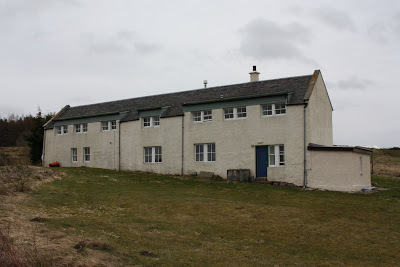
I've been sharing the blog posts I wrote about my experience at an Arvon writing course, to mark seven years since the experience. Please see this post for background and parts 2 , 3, 4 and 5 to catch up so far. This is the final instalment!
This post originally appeared on my blog Green Ink in April 2010, and has been slightly edited.
And so I sat, as I let the enormity of the decision I was about to make sink in.
Did I want to keep going with The Memory of Us? At this very moment, the answer is no. I want to have a break from it. It isn't fun to write anymore. I have invested so much time and energy into it, and I know is a story that I will tell, that will be told. I just need to have a break from it. It just isn't inspiring me at the moment. The direction I have taken it in is definitely the wrong one, and I will need time to find my way again. I need to forget about all the bad influences on it, the doubts, the fear, the threats, the heavy weight of expectations. It needs to be free of those and find a new way through. I know I set the bar too high for myself, telling myself it could be nothing less than a masterpiece. It is no wonder I have struggled so much.
I want to write about what I have seen, done, felt and known. I want to be able to sit and write with authenticity, humour and vivacity. I want writing to be fun again. In those few hours of writing that other story, purely from my own imagination, I had a glimpse of my writing life as it could be, and I wanted to grab it with both hands.
It didn't hit me how bored I'd been with The Memory of Us until I'd finally admitted it out loud. I don't doubt that, eventually, the story will be told. But when - that is a question I don't have an answer for right now. I think the decision to focus on other things that are a bit more fun to write is a good one - and I also think it's been building for a while. I was just too afraid to admit it. The characters just weren't setting my imagination on fire. I've been frustrated and disillusioned for quite some time. But how could I admit this, after so much investment, so much work, over the past two and a half years - to say nothing of all the coincidences and twists of fate that led me to think yes, yes, yes, this is the story I've been waiting for.......
I've really let my pride get in the way here, I think. And I'm not short changing The Memory of Us, by any means. I just want to have a break from it. It did not prove to be stimulating or inspiring company in the near week I was with it constantly. When I talked to Morag about it on Wednesday, she seemed to think that this project had been weighing me down quite a bit, and it wouldn't be a tragedy if I put it aside for a while.
"But what would be a tragedy," she cautioned me, "is if you stopped writing all together."
There's no danger of that! Now, it feels like the possibilities for me have grown a bit wider. With time and energy to devote to things I do want to write about I feel like there are wider waters for me to cast my net. Topics I might not have thought were really my thing now intrigue me. I want to give pleasure with my writing. And I think that will only happen if it is a pleasure for me to write.
There are so many things I want to write about. I want to write about relationships, friendships, parents and their children, about people chasing their dreams. I want to write about people transcending circumstance. I want to write about fear and desire and love. I want to write about my country, the cities I've lived in, why I love it, why I left it and why I might or might not go back. I want to write about the city I live in now, where my freedom and independence came of age. People have told me often over the years that my own life has a wealth of material - and maybe it's time I started listening.
I don't really know what expectations I had coming on this course really - there was part of me that thought I'd walk away with The Memory of Us virtually finished, and there was another part of me that knew it was crunch time, and there was another part of me that wanted it to be the start of something, the end of the beginning, as Churchill put it.
So there you have it, my decision. Out in the open. I am free. I wonder what will happen.
~~~~~~~~~~~~
The last night of the course was excellent. Over dinner we were given the task of writing a poem about any aspect of our time at Moniack - I wrote a traditional Aussie ballad about "Donald", this enigma of a character who had started making an appearance in the group class work! It was fun to write, and I didn't struggle with the rhyme like I have done in the recent past, I felt like I did as a teenager, making up silly poems for school plays or to make my sisters laugh. We all read our poems aloud to laughter and applause. Then, just as we were being served dessert, we heard the strains of....bagpipes?!
Not unexpected, I suppose, seeing we were in the depths of Inverness, but it sounded like it was coming from the kitchen! Sure enough, the door was opened and there was one of the Moniack staff's daughters, in a kilt, playing "Happy Birthday" on the bagpipes! It was one of our group's birthday, and they had arranged a cake and a piper in her honour. After the birthday song finished, the piper launched into a traditional tune and we all started clapping and stamping - it was amazing! All I needed to make the evening complete was a dram of whisky :)
I then poured an enormous glass of Cabernet Syrah and settled in for the group reading, which was taking place in the main room in front of the roaring fire. Everyone read. It was wonderful to finally hear some people's work, having been curious about it all week. Some of it was exquisite. Everyone's work is so different. The voices were so unique, no story was the same. It was wonderful to feel, possibly for the first time in my life, completely unintimidated. It was impossible to compare our work to anyone else's, because all the projects really are so different. It was really nice to feel among peers. Happy that I'm doing my own thing, and they are doing theirs.
I read my short story with gusto and humour, and some exaggerated accents - I got laughs where I hoped I would get them, and I was pleased with the flow of the narrative. There were bits I was really pleased with, that I could hardly believe I had written at all. Morag came up to me afterwards, her eyes shining, and told me how pleased she was, and that my writing just "sparkled" in that story. That made me very happy.
When we'd all read, Morag and Tim spoke briefly about the week and what their advice was to us upon leaving and going back to our normal, busy lives. Morag's wish for us all was to have energy and courage. Tim said for us to keep the momentum going, to continue to make the time and space to write every day.
I have definitely come away with that feeling. To keep the energy going, now that it has been unlocked. The course description was about falling in love with your novel again. I went a bit deeper than that. I fell in love with writing again.
April 9, 2017
from the archives: my experience on an arvon novel writing course (part 5)
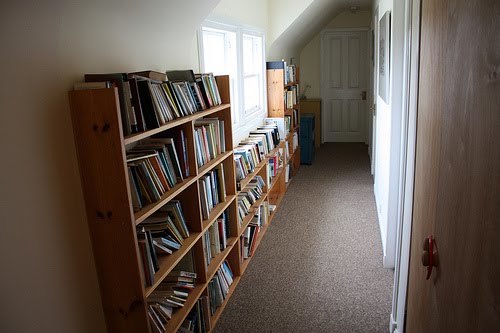
Another suitcase in another hall.....
This week I've been sharing the blog posts I wrote about my experience at an Arvon writing course, to mark seven years since the experience! Please see this post for background and parts 2 , 3 and 4 to catch up so far.
This post originally appeared on my blog Green Ink in April 2010, and has been slightly edited.
Friday 9th April 2010
The last full day on the Arvon course. Hard to believe, really. It's been amazing what writing something every day has done for me. It's reemphasised to me just how important it is, as any successful writer will tell you, to just show up every day and write. It doesn't matter what you write, or whether it's any good. You just have to do it. It sounds easy, doesn't it? But the truth is, it's hard. It's very, very hard. If it were easy, there would be no need for courses like this really. I don't know what my own reasons for avoidance have been - perhaps a whole host of psychological barriers it would take a textbook to explain, perhaps just pure laziness. Wanting to get out there and live life rather than just write about it, maybe.
This morning was our final class, with Morag, on plot. She showed us a photo she'd taken on holiday in New Zealand a few months ago. It was a sign in a shop window. We had to come up with a character, a set of circumstances and a things that gave them solace, grief and uncertainty. From this we were to develop a plot.
I don't think I stopped writing for the entire two hours. I was completely lost in it. Words, ideas, energy just flew out of me. Facts, history, real life timelines had no place. It was just up to me, so off I went.
Until that moment, I had forgotten how much fun writing is. I hadn't written this way since I was at school - well over ten years. Something was unlocked. My cheeks were pink and my eyes were bright. I felt energised, happy and excited about what I'd written. It's been ages since I've felt like that.
Went and had lunch, and then joined some of the girls on a little drive down to Loch Ness. Snapped photos of the vast, impressive Loch. You only have to look at it to know that it's bottomless.
Then we returned to Moniack and I went upstairs to work. I was still buzzing with the energy of what I'd written earlier. I loaded up The Memory of Us and stared at the last bit I'd written, feeling dull. My eyes hurt looking at it. I didn't want to try and write anything. The energy I had from earlier was bouncing off that impenetrable, invisible wall.
I was so very frustrated. I picked up my journal and reread the story I'd written by hand in my journal that morning. It was pretty good, I thought. It sparkled. It had wit and vivacity and a sense of fun - all things I want my writing to have. So I just thought I'd type it up, from the notes. Just to have my fingers moving, to be doing something instad of sitting there, stewing, feeling frustrated.
So I typed it up and enjoyed every minute of it. Tweaked a few things, but I typed away until I got to the natural point of conclusion and then sat back and surveyed the work I'd done. Two hours had just flown by.
Then I had to think about what I was going to read at the group gathering that evening. Everyone had been asked to read a small selection of their work - it could be anything we wished, anything we were particularly pleased with or attached to, anything we felt showcased us well as writers.
So I clicked my mouse over the still open Memory of Us document. Read through it. Well, skim read it really. All the words and thoughts blurred together. It really is the dullest thing on the face of the earth. Well, maybe I'm being too harsh. I noted a few random paragraphs where I thought "that's pretty good" or "I like that", but these were just lone paragraphs, unrelated, from different parts of the story. I had to read aloud for at least 5 minutes and I had maybe 60 seconds worth that I was happy with?!
Then it hit me. 127 pages. Over 40,000 words. And there wasn't any significant chunk of it I felt was worth reading aloud to people. I felt like I'd been whacked in the chest.
And then I looked at the story I'd just written. Granted, it was only a first draft and wasn't perfect, but I liked it! It had something! I liked Viv and Rose and Col. I wanted to know more about them. I wanted to know what happened at the Auckland Cup. I wanted to know what happened to that ten dollar note that Helen Clark used to pay for the brooch.
I wanted to read that story aloud. I felt that those couple of hours I'd spent on that story had revealed so much about what kind of writer I want to be.
And so I sat, as I let the enormity of the decision I was about to make sink in.
Yes, I'm terrible and will make you wait for the next bit. Ha ha!! :)
Philippa Moore's Blog
- Philippa Moore's profile
- 7 followers



